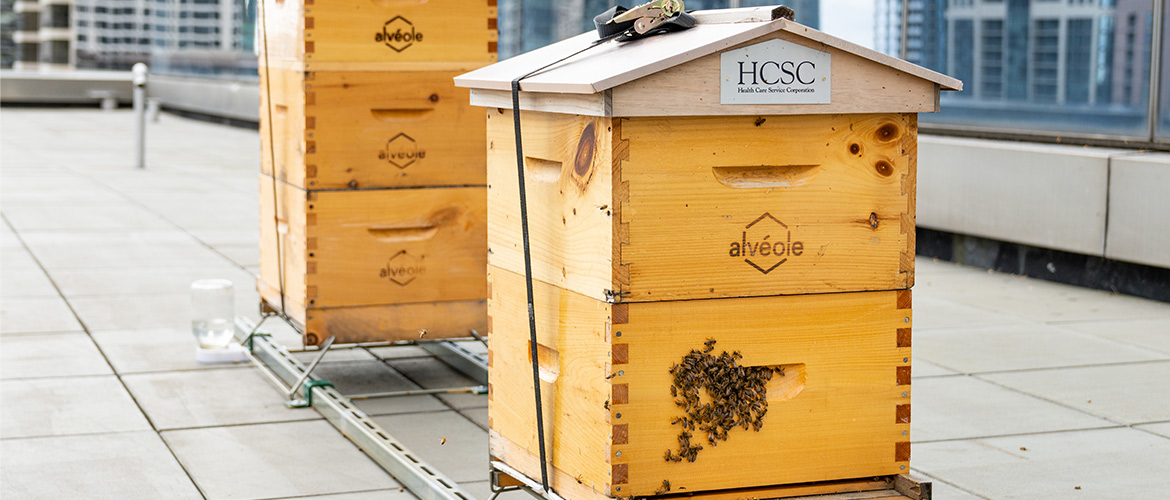There’s a buzz in the air at Health Care Service Corporation (HCSC). It’s the hum of more than 300,000 new honeybees.
HCSC is expanding its urban beekeeping project to its health plan headquarters in Montana, New Mexico and Texas after successfully running the program at its Illinois headquarters for the past three years. The move is part of HCSC’s sustainability push, and each hive houses at least 20,000 docile honeybees that aren’t interested in bothering humans.
Beekeepers from Alveole, a company that helps businesses, schools and other organizations bring bees to their buildings, will maintain the hives and educate employees about the insects’ role in environmental sustainability.
"We want everyone to feel like they're a part of the conversation and the sustainability movement within HCSC."
“The power of this project is that it gets people talking and involved,” says Amy Amaon, sustainability engineering consultant at HCSC. “The bees are very visible. We want everyone to feel like they're a part of the conversation and the sustainability movement within HCSC.”
The program kicked off in 2019 at HCSC’s Illinois health plan headquarters in Chicago. After two years observing the colonies, beekeepers recently relocated the two hives from the 26th floor to the fourth floor to protect them from windy conditions.
HCSC’s other plans have been asking for their own hives after hearing about the pilot program’s success, Amaon says. The colonies in Montana and New Mexico will be Alveole’s first in each state.
“I’m really excited about this project,” says Amy Owen, an Alveole beekeeper caring for the hives at the Albuquerque office. “I love the idea of corporate responsibility and New Mexico acting as an example to other corporations of how their practices impact the environment.”
Bees have an outsized influence on the ecosystem. They spend their lives flying miles from home looking for food sources and, moving from flower to flower, they collect pollen on their legs and underbellies and spread it around the environment during their hunt for pollen and nectar.
That nectar is needed to produce everyone’s favorite bee product: honey. Each fall, beekeepers harvest about 200 jars from each office location. The harvest will fluctuate depending on the health of the bees and local rainfall. The honey will be available for sale to employees.
Cam Lay, who has been working with bees for decades and is overseeing the Helena hives, hopes the project can help people see the need to save the wider bee population.
“Bees are cool, people like bees. That easily translates to an appreciation for all the wild solitary bees out there doing very similar things but without human support,” he says. “Almost everything that benefits honeybees also benefits the native bees and native pollinator community that is in fact in trouble.”
As pollinators, bees help grow many of the crops we eat, including chocolate, coffee and many healthy foods. Bees also produce resources with medicinal properties.
But pesticides and climate change are killing wild bee communities. So HCSC’s hives represent a small act of conservation.
“It's a shift from looking at just the business to focusing on how we impact people and the environment,” Amaon says. “My vision is for HCSC to be top tier for sustainability.”
Each plan site has its own unique climate challenges for beekeeping.
For example, in Texas, beekeepers must ensure the hives receive enough water and are insulated to survive the sweltering summer heat. In Montana and Illinois, hives must be set up to survive long and windy winters.
The Alveole team recently completed a successful site visit at the Oklahoma plan headquarters in Tulsa and is now investigating the potential for an early summer 2023 beehive installation. It would be Alveole’s first project in the state.
No matter the state, people who engage with the bees will come away with a better understanding of their environment, says Ally Pixler, an Alveole beekeeper caring for the Chicago hives.
“If everyone makes small changes in their life to help support these honeybees, by proxy, they are helping all our native pollinators,” she says. “All these small changes will lead to some really significant impacts on our local ecology.”

